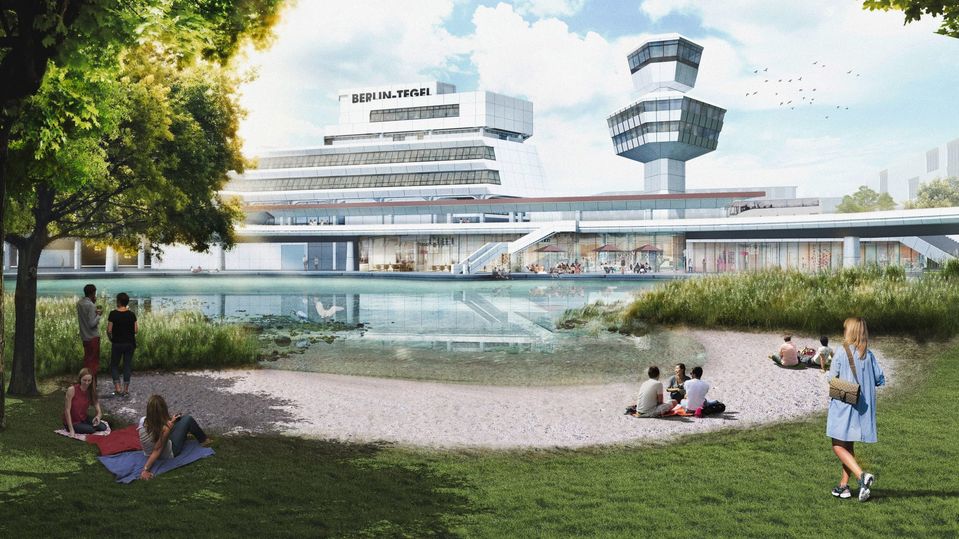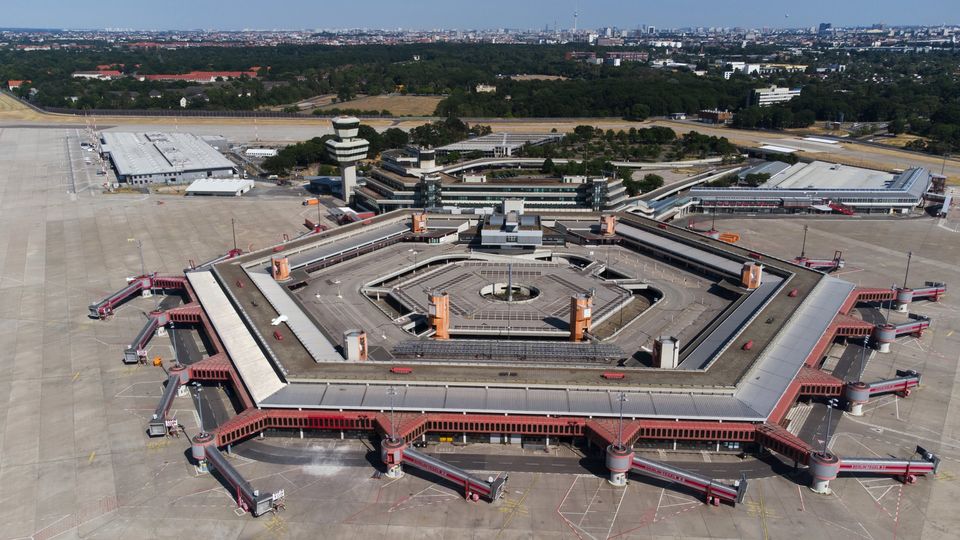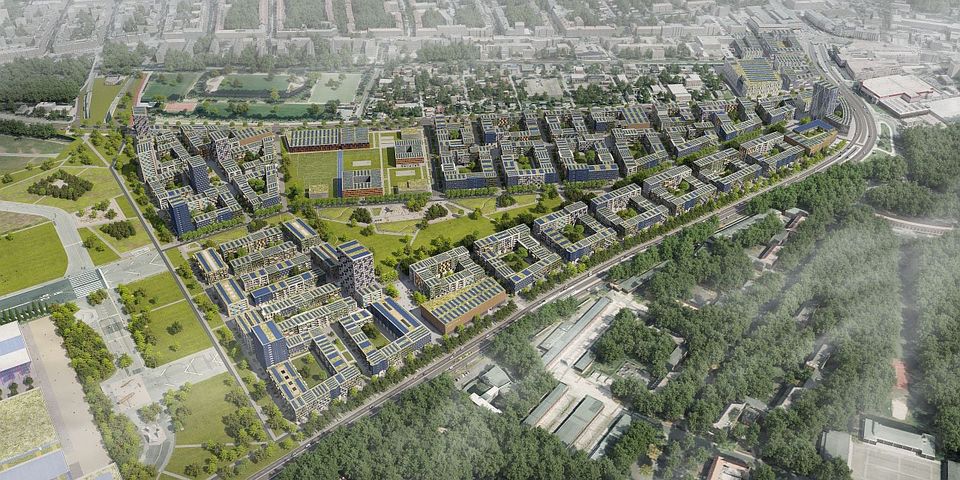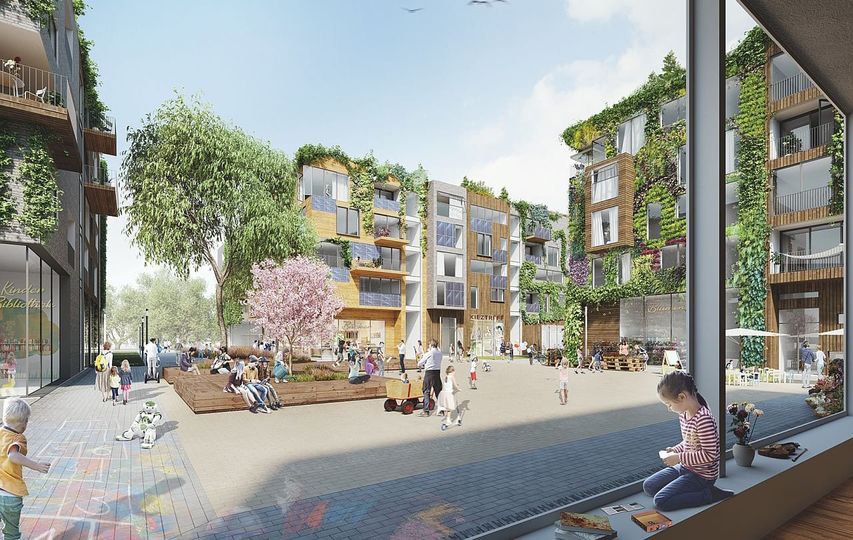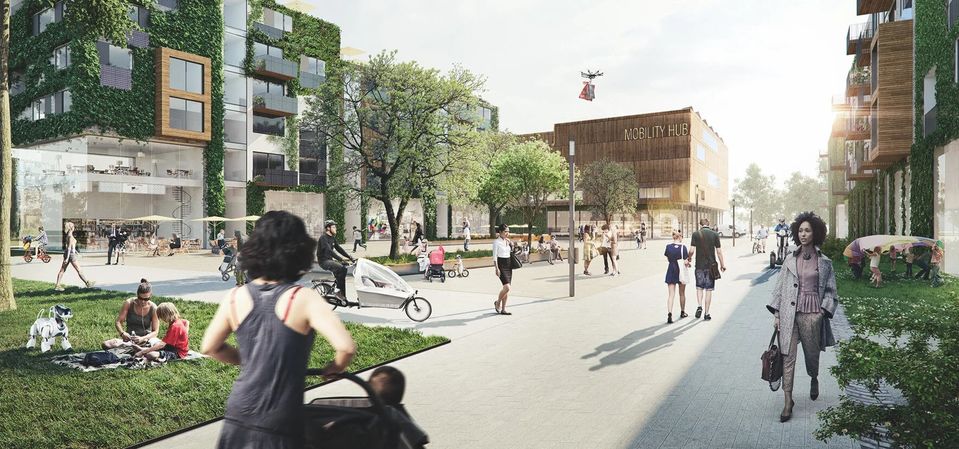Tegel Airport is Berlin’s biggest redevelopment since the Wall fell
Former Tegel airport is a huge opportunity for the German capital, which has struggled with large-scale infrastructure projects.

When Berlin was gripped by the coronavirus, it turned the disused Tegel airport into a vaccination center, giving the Cold War-era facility a second lease on life. As the pandemic gradually eases, that time is coming to an end, presenting the city with a 5 million-square-meter opportunity.
The vision for an area more than twice the size of Monaco calls for car-free zones, homes for more than 10,000 residents and a cutting-edge technology park in and around Tegel’s iconic hexagonal terminal building.
Nearly half the space will be set aside as a nature reserve, and rainwater will be conserved as part of a sustainability concept.
It’s the biggest redevelopment since the city stitched itself back together after the fall of the Berlin Wall more than 30 years ago.
But with elections fast approaching and authorities under pressure to ease a worsening housing squeeze, there’s a chance that it gets bogged down, reviving the city’s spotty track record with major infrastructure projects.
“The absence of wavering political agendas is vital,” said Philipp Bouteiller, chief executive officer of Tegel Projekt, the city-owned company managing the effort.
Airport redevelopments tend to be fraught and contested in any major city, as the sheer volume of land unlocked for building makes the stakes especially high.
Reconstruction at sites such as Hong Kong’s Kai Tak Airport and Athens’s old terminal at Ellinikon have sparked fierce debates about future priorities and the balance between public good and private interests.
In Berlin, with the city trying to reconcile its past as an affordable, offbeat haven with its growing role as a thriving start-up hub, Tegel is likely to prove similarly controversial. The project is political from its inception. The original calls for proposals focus on how the site will serve the city.
As Regula Luescher, Berlin’s secretary for urban development, puts it: “The Projekt Tegel is 100% a subsidiary of the city of Berlin.”
The redevelopment – estimated to cost a total of €8 billion (US$9.5 billion) in public and private money – is set to start after the management company officially assumes ownership on August 5.
That’s effectively years late, because the airport was kept in service far longer than planned due to the delayed opening of the Berlin Brandenburg Willy Brandt Airport, known by its airport code BER.
The new hub on the southern outskirts of the city was planned by a state-owned entity, like the Tegel redevelopment.
It scrapped its debut just weeks in advance of its planned launch in June 2012, with tickets issued and moving trucks ready to roll. The case study in bungled project management finally opened last fall.
The BER fiasco followed another failed effort to redevelop a Berlin airport. Housing was slated for sections of the Nazi-built Tempelhof airfield – a gaping green space near the city center. But an upswell of resistance spurred a referendum, which blocked the plan in 2014.
Today, the runways and tarmac are public space, and the imposing terminal building is temporarily a center for Covid-19 vaccinations, like Tegel.
Berlin’s administration again faces civic action in the form of a referendum. The latest push is to some extent a legacy of the aborted housing plan in Tempelhof, with those missing homes contributing to the squeezed apartment market.
In the plebiscite, activists are seeking to force the city to buy out large landlords over concerns about their market power.
Regardless of the referendum’s outcome, authorities are under pressure to ease the strain on tenants – the vast majority of Berlin residents – especially after Germany’s constitutional court overturned the city’s controversial rent-freeze law in April.
That leaves little alternative to building more homes, and Tegel’s vast expanse could be too tempting to leave untouched.
While the project includes about 40% social housing, the concept – adopted in 2013 after five years of discussions – feels out of step with a city straining to keep up with its own growth.
The project could even contribute to Berlin’s overcrowding. There’s space for 5,000 students and 20,000 jobs at the site’s Urban Tech Republic industrial park, compared with housing for less than half as many people in the adjacent Schumacher Quartier housing development.
“I wouldn’t be surprised if the pressure mounts” to build more low-cost homes, said Bouteiller. But increasing the share of social housing to more than 50% “can have a negative development in terms of social fabric,” he added.
City officials may also resist meddling in the project and keep it a symbol for Berlin’s forward thinking.
The project’s mobility concept relies on public transport – initially electric buses until a tram is constructed after the first homes get delivered in 2027 – and bike paths, including fast lanes. Private cars are to be largely banned from the area.
Construction is slated to use environmentally sustainable materials. Excess energy from the tech park will heat the residential areas. Rainwater will be collected and then redistributed to maintain the nature reserve and other landscaped areas.
Luescher notes the plan has survived three different city administrations and insists the September elections won’t change that.
“The basic principle, the substantive interpretation of it, is stable and is not in question should there be any possible changes in the coalition government,” she said.
This article is published under license from Bloomberg Media: the original article can be viewed here
